Le Groupe de l’appui à la médiation (MSU) du Département des affaires politiques et de la consolidation de la paix (DPPA) sert de point focal à l’échelle du système des Nations Unies en ce qui concerne l’expertise et de l’appui en matière de médiation. Ce groupe fournit notamment un appui opérationnel adapté à chaque processus de paix et de dialogue grâce à son personnel spécialisé et à l’Équipe de réserve de conseillers principaux pour la médiation.
Nos activités
Les compétences principales du Groupe de l’appui à la médiation comprennent une assistance opérationnelle à la médiation et aux processus de paix, un renforcement ciblé des capacités des partenaires et la formulation d’orientations concernant la médiation, les enseignements tirés et les meilleures pratiques.
Le personnel du Groupe, qui comprend des experts internes en matière de cessez-le-feu, d’élaboration de constitution et de conception de processus, est en mesure de fournir un soutien sur mesure tout au long des phases de planification, de mise en œuvre et d’évaluation d’un processus de médiation. Le Groupe gère en outre l’Équipe de réserve de conseillers principaux pour la médiation, qui peut être mobilisée en tant que capacité complémentaire d’appui à la médiation.
Le Groupe organise une série de formations phares, notamment le cours de médiation de haut niveau des Nations Unies (UN High Level Mediation Course), le cours de médiation sur le cessez-le-feu (Ceasefire Mediation Course) et le cours sur les femmes dans les négociations de cessez-le-feu (Women in Ceasefire Negotiations Course). Par ailleurs, le Groupe de l’appui à la médiation élabore et actualise des directives et des ressources destinées aux médiateurs. On peut notamment citer une base de données sur les accords de paix dans laquelle il est possible de faire des recherches, ce qui permet aux médiateurs de comparer les formulations employées dans 1 300 accords, soit plus de 75 000 dispositions. Sur demande, le Groupe fournit également aux missions sur le terrain des conseils sur mesure, souvent au moyen d’une analyse comparative de cas.
Le Groupe de l’appui à la médiation travaille fréquemment en partenariat avec diverses organisations régionales. Il est également membre de plusieurs réseaux de médiation, dont le Groupe des Amis de la médiation et le Réseau d’appui à la médiation, et il collabore régulièrement avec l’Alliance mondiale des réseaux régionaux de médiatrices.
La capacité d’appui à la médiation du DPPA dépend principalement du financement issu de l’appel pluriannuel, qui permet notamment de fournir un appui aux pourparlers de paix sur le terrain. Grâce à un financement durable, le Groupe de l’appui à la médiation pourra continuer à déployer des experts opérationnels en cas de besoin ainsi qu’à élaborer des approches innovantes et des directives en matière de médiation dans des domaines émergents, tels que les technologies numériques, le climat, la médiation locale et infranationale et le programme relatif aux jeunes et à la paix et à la sécurité.
Un appui mondial
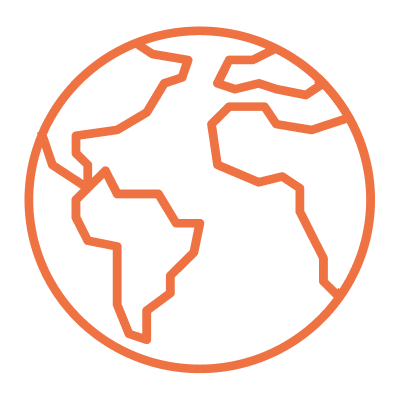
Nous apportons notre appui à la médiation dans 25 à 30 pays par an.
Un appui flexible

Nous soutenons un large éventail d’efforts de prévention, de dialogue, de médiation et de concrétisation de la paix auprès de différents types de médiateurs.
Un appui rapide

Nous pouvons déployer des experts en médiation de haut niveau dans les 72 heures suivant la réception d’une demande.
Un appui innovant et inclusif

Nous intégrons les questions de genre et d’inclusion dans nos conseils et utilisons des approches innovantes qui répondent aux défis des conflits contemporains.
Enrichir nos connaissances et aider les autres à apprendre
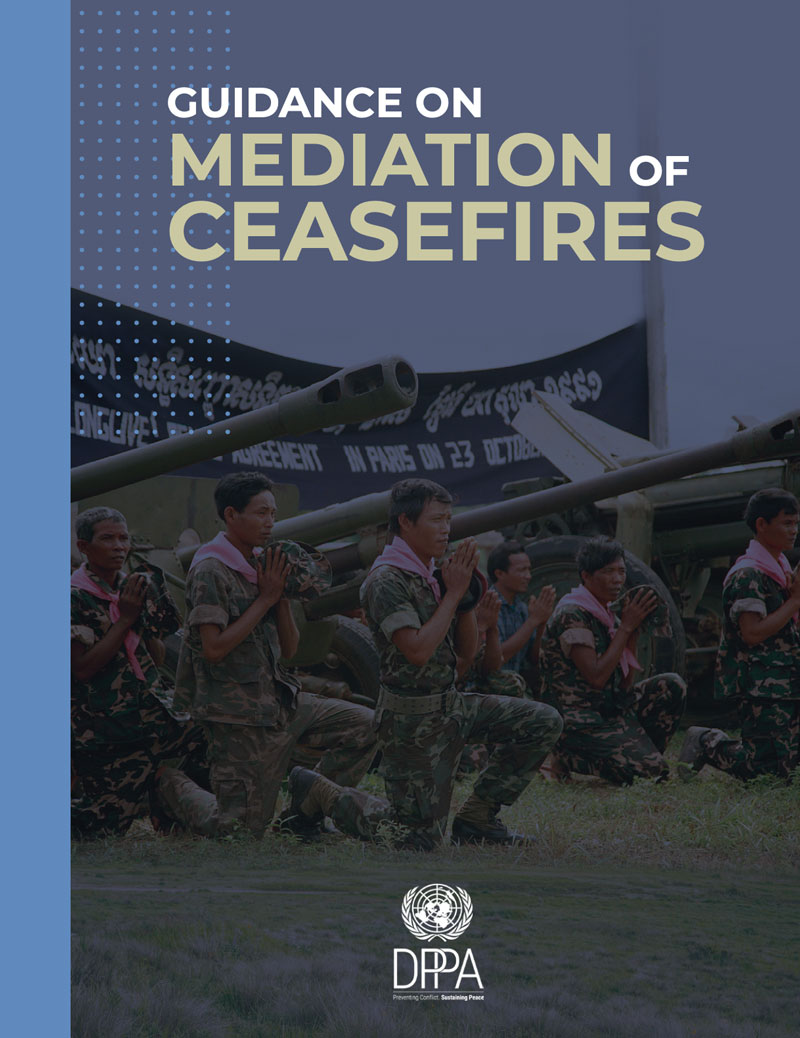
Ces directives sont conçues pour venir en aide aux hauts responsables et au personnel de l’ONU, aux médiateurs et aux facilitateurs au sein et en dehors de l’Organisation, ainsi qu’à leurs équipes, aux parties au conflit, aux représentants des États et des organisations régionales, aux organisations non gouvernementales nationales et internationales, aux groupes de femmes et à d’autres parties prenantes aux processus de paix.
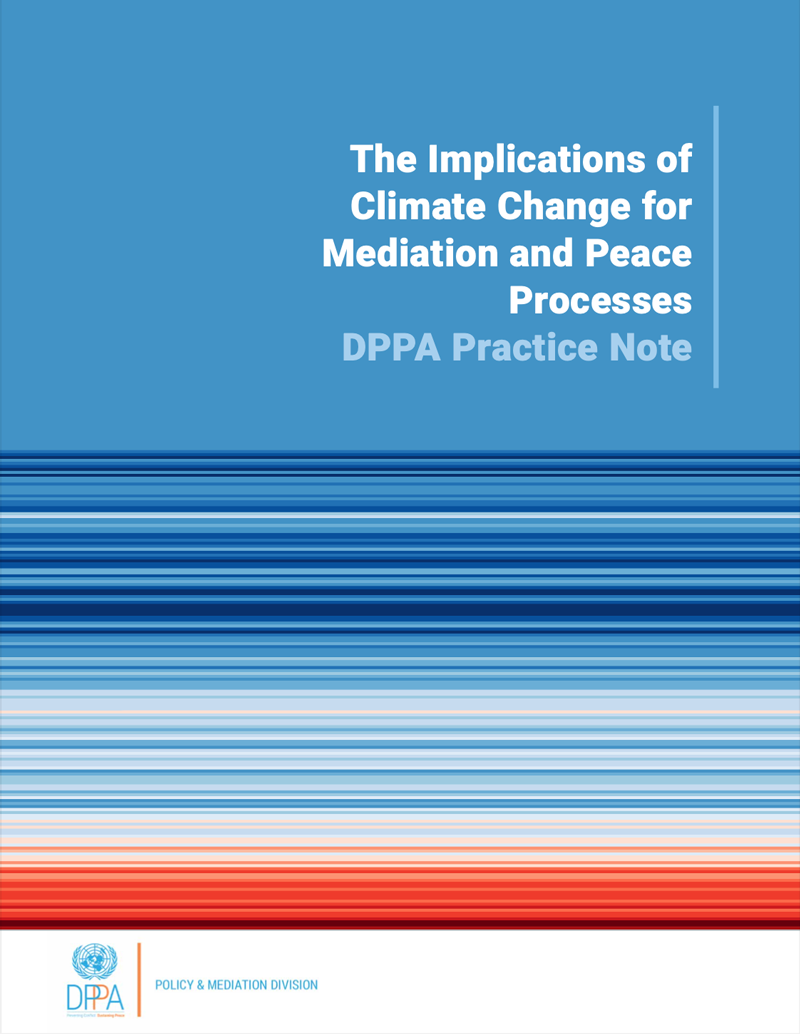
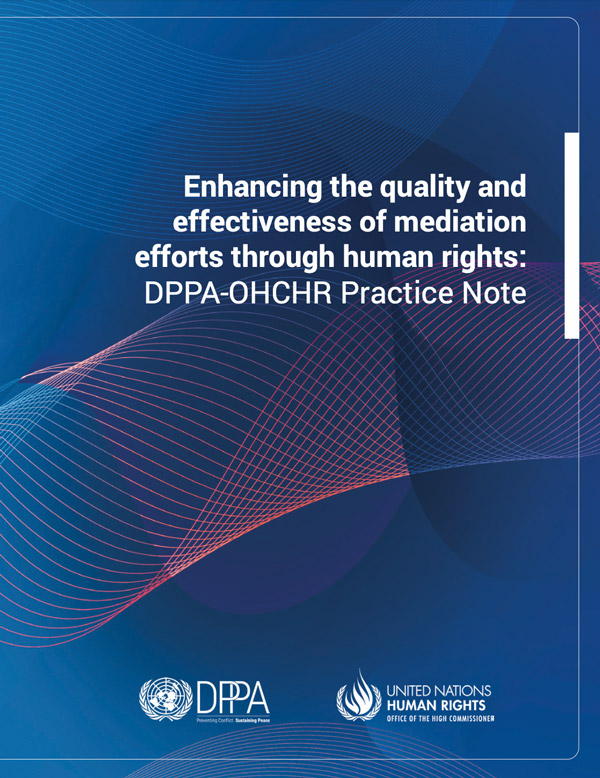
Cette note de pratique, fruit d’une collaboration entre le DPPA et le Haut-Commissariat aux droits de l’homme (HCDH), explore des stratégies pratiques et des exemples concrets pour aider les médiateurs et les praticiens des droits humains à intégrer les principes et les considérations relatifs aux droits humains dans leur travail en général et à chaque étape des efforts de médiation en particulier. Il y est démontré que les droits humains offrent des solutions pratiques à de nombreux défis que les médiateurs tentent de surpasser.
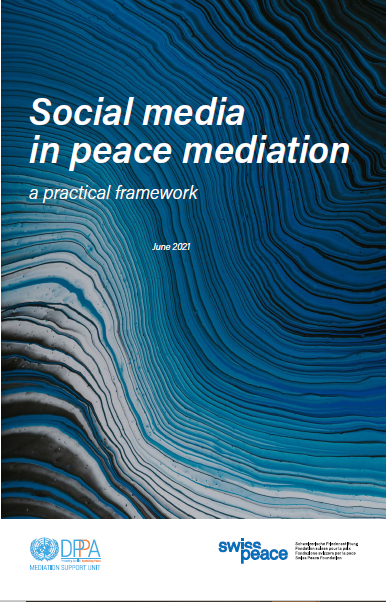
Rédigé conjointement par l'unité de soutien à la médiation du DPPA et swisspeace, ce document examine l'impact des médias sociaux sur la médiation de paix, propose des suggestions pratiques aux médiateurs et à leurs équipes et pose des questions à approfondir et à analyser. Le document comprend également des exemples illustratifs d'utilisation pratique des médias sociaux.
Nous vous invitons à consulter la page des ressources pour obtenir d’autres documents d’orientation, de politique et de pratique en matière de médiation.
Faits marquants en 2024

167 déploiements de personnel/conseillers
sur demande d’aide à la médiation

138 missions d’appui à la médiation de l’Équipe de réserve
dans environ 27 contextes différents

Fourniture de conseils et d’appui techniques en matière de genre et d’inclusion
fournie dans l’intégralité des processus de paix dirigés ou codirigés par l’ONU
Appui fourni en 2024, par thème
Appui fourni en 2024, par région
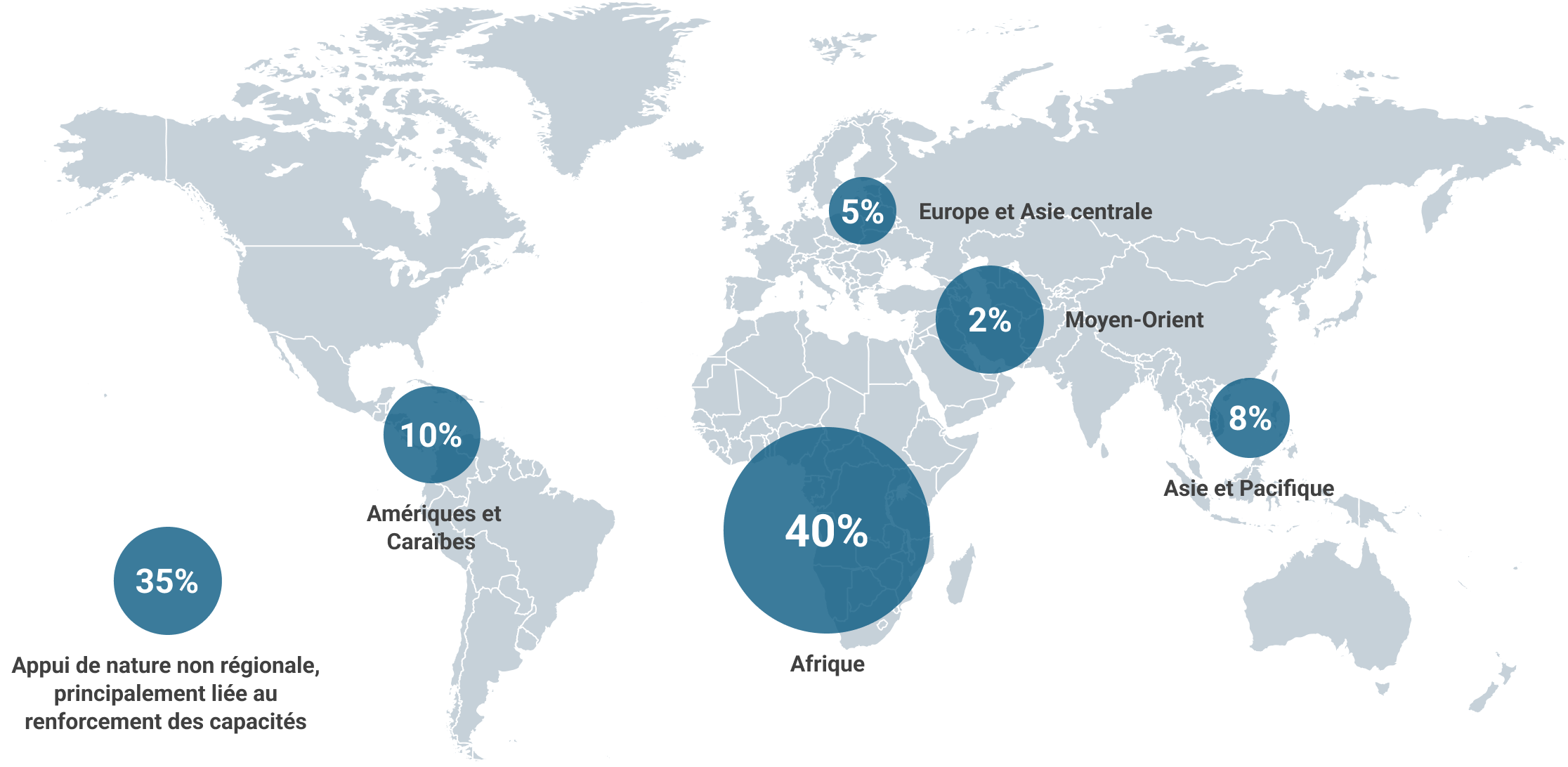
Aperçu des activités actuelles
Mis à jour le 31 décembre 2024
Chili
Du 4 au 8 novembre, un expert en conception de processus SBT et un membre du personnel de la MSU se sont rendus à Santiago du Chili pour soutenir la Commission présidentielle pour la paix et la compréhension. Cette mission, étroitement coordonnée avec la Division des Amériques de la DPPA-DPO et le Bureau du Coordonnateur résident (RCO), s’appuie sur le soutien antérieur fourni par l’ONU à la Commission tout au long de l’année 2024. Au cours de la mission, le membre du SBT et le personnel de la MSU ont interagi avec un large éventail de parties prenantes, y compris des responsables gouvernementaux, des membres de la Commission et des représentants du secteur privé, afin de renforcer l’engagement technique et l’assistance des Nations Unies. En s'appuyant sur les meilleures pratiques internationales, l'équipe a partagé des enseignements clés sur le renforcement du consensus, les formes de dialogue institutionnalisé et les mécanismes de mise en œuvre et de suivi, offrant des perspectives précieuses pour renforcer le travail en cours de la Commission avant qu’elle ne présente ses recommandations à la Présidence dans les mois à venir.
Aucune activité durant cette période
Yémen
Le conseiller principal de la MSU sur les cessez-le-feu et les arrangements de sécurité a continué de fournir des conseils techniques et un soutien à l’OSESG-Yémen. La MSU a offert des conseils techniques pour planifier une série de réflexions proposées au Comité de coordination militaire (MCC). Dans le cadre de ces engagements, le conseiller de la MSU a soutenu la tenue d’une réunion de trois jours avec une délégation du gouvernement du Yémen en décembre 2024. Ce soutien devrait se poursuivre en 2025.
Communauté d'Afrique de l'Est (CAE)
L’expert SBT en genre et inclusion a été déployé à Bujumbura, Burundi, du 30 octobre au 1er novembre pour contribuer au contenu et à la structure de la version finale du Plan d’action régional de la CAE sur les femmes, la paix et la sécurité (FPS) et soutenir son exercice de validation. Ce déploiement faisait suite à un atelier conjoint DPPA/CAE/ONU-Femmes organisé à Entebbe, Ouganda, en décembre 2023 sur le thème « Renforcer l'agenda Femmes, Paix et Sécurité dans la région de la CAE », qui avait élaboré le projet de Plan d'action régional sur la FPS.
La réunion de validation a rassemblé le Groupe de travail multisectoriel de la CAE, composé de 29 participants : experts régionaux, représentants gouvernementaux de la communauté de la CAE, acteurs de la société civile et partenaires internationaux (ONU-DPPA et ONU-Femmes). L’expert SBT a enrichi les délibérations en partageant des expériences comparatives d’autres régions, en clarifiant les concepts et la portée de l’agenda FPS et en fournissant des documents pertinents pour améliorer le projet de Plan d’action régional de la CAE. Ces contributions ont permis à un consultant de la CAE de finaliser le projet de Plan d’action régional.
Région des Grands Lacs
En octobre 2024, un expert SBT en conception de processus a été déployé à Luanda pour soutenir un Forum de haut niveau sur la participation des femmes dans la région des Grands Lacs, convoqué par l’UA et l’Angola. Le thème général du Forum portait sur le renforcement de la participation et du leadership des femmes dans les processus de paix et de sécurité dans les Grands Lacs, notamment dans l’est de la RDC, dans le cadre du « processus de Luanda » dirigé par l’Angola et mandaté par l’UA pour normaliser les relations entre la RDC et le Rwanda.
L’expert a animé une session sur les expériences comparatives d'autres processus de paix où des femmes ont élaboré une position commune lors des négociations et a apporté un soutien substantiel en facilitant les discussions de groupe pendant les deux journées.
Lesotho
En novembre, conformément à une demande transmise par le RCO et la Division Afrique centrale et australe de la DPPA-DPO, la MSU a déployé deux experts SBT (conception de processus, genre et inclusion) à Maseru, Lesotho, pour soutenir le Collège des Chefs. Plus précisément, les experts ont aidé à faciliter un troisième cycle de dialogue entre les chefs visant à développer une compréhension et une vision communes du rôle du Collège, dont les membres siègent tous en tant que sénateurs dans la chambre haute de la législature.
Ce déploiement faisait suite à une demande d’appui supplémentaire formulée par le Collège des Chefs lors du cycle précédent en juillet, afin de renforcer ses capacités en matière de médiation et de règlement des différends, compte tenu du rôle quasi-judiciaire des chefs à l’échelle locale. Lors de cette mission, les experts ont créé un espace permettant aux chefs de se concentrer sur les discussions liées aux stratégies de mise en œuvre de leur vision commune concernant le rôle du Collège et de renforcer les compétences nécessaires à l’accomplissement de leur mandat.
Libye
Le MSU continue de soutenir la MANUL dans la mise en œuvre de son mandat global, en particulier en ce qui concerne la conception des processus de médiation, les cessez-le-feu et les arrangements de sécurité. En octobre, la MANUL a demandé le déploiement d’un expert en conception de processus SBT pour appuyer la conception d’un processus de dialogue inclusif et multi-pistes. Sur la base de consultations approfondies au sein de la Mission, l’expert a élaboré des documents d’orientation pour aider la direction de la MANUL à développer une stratégie politique globale. À la suite de ces travaux, le 16 décembre, le Représentant spécial adjoint Khoury a présenté une déclaration de vision au peuple libyen et au Conseil de sécurité, exposant un processus politique global pour la Libye.
Le conseiller du MSU sur les cessez-le-feu et les arrangements de sécurité a soutenu la MANUL dans l’organisation d’un deuxième atelier pour les acteurs militaires et sécuritaires libyens à Tunis en novembre. Lors du précédent atelier en mai, également soutenu par le conseiller du MSU, le ministère libyen de la Défense et d'autres acteurs du secteur de la sécurité ont conjointement élaboré un code de conduite pour améliorer la fourniture de la sécurité, la protection des civils et le respect des droits de l'homme dans le pays. Ce deuxième atelier s’est conclu par des recommandations visant à activer le Code de conduite pour le personnel militaire et de sécurité, à améliorer les plans de sécurité conjoints, à coordonner les procédures de sécurité aux frontières et à lutter contre l'extrémisme violent et la migration irrégulière.
Sierra Leone
Un expert en constitution mobilisé via le mécanisme SBT a participé à une discussion virtuelle avec le PNUD, l’Assistance électorale du DPPA, les Divisions Afrique de l’Ouest du DPPA-DPO, ainsi que le Bureau du Coordonnateur résident (RCO) en Sierra Leone, afin de conseiller ce dernier sur un éventuel engagement avec le gouvernement de la Sierra Leone dans le cadre du processus de révision constitutionnelle.
Soudan du Sud
Le MSU a continué de soutenir la MINUSS dans la mise en œuvre de ses activités mandatées, y compris l'application de l'Accord revitalisé sur le règlement du conflit au Soudan du Sud. À la demande du Représentant spécial du Secrétaire général (RSSG) Haysom, un expert en conception de processus SBT a été déployé au Soudan du Sud en décembre pour analyser les accords de paix locaux facilités et soutenus par la Mission, et recueillir des informations auprès des acteurs directement impliqués dans ces processus de médiation. L’objectif global de cet examen était d’approfondir la compréhension des facteurs influençant la réussite ou l’échec des accords de paix locaux au Soudan du Sud. L’expert a consulté divers acteurs à Juba, y compris des responsables onusiens, des ONG et des parties prenantes sud-soudanaises, et a effectué des visites de terrain dans les bureaux de la MINUSS à Wau et Rumbek. Les conclusions et recommandations de cette étude fourniront des orientations à la Mission pour renforcer sa capacité à soutenir les acteurs sud-soudanais dans la mise en œuvre d'accords de paix durables et contribuer à la paix et à la stabilité à long terme dans le pays.
De plus, à la demande de l'équipe Constitution de la MINUSS, un expert en questions constitutionnelles a été mobilisé via le mécanisme SBT pour fournir une expertise sur l'élaboration de constitutions et le fédéralisme lors d'un atelier organisé par la Mission et l'Université de Juba. L'expert a présenté des exposés à plusieurs parties prenantes sud-soudanaises, y compris des experts constitutionnels, des décideurs politiques et des universitaires.
Soudan
Au cours de la période couverte par le rapport, le MSU et le mécanisme SBT ont continué de soutenir la Division Afrique de l'Est du DPPA-DPO (EAfD) et le Bureau de l'Envoyé personnel pour le Soudan (OPESG). En octobre, le personnel du MSU a également fourni des contributions relatives aux cessez-le-feu au Rapport du Secrétaire général au Conseil de sécurité sur les « Recommandations pour la protection des civils au Soudan », comme demandé par la résolution 2736 (2024) du Conseil de sécurité.
Le conseiller principal du MSU sur les cessez-le-feu et les arrangements de sécurité a poursuivi son assistance à l'équipe soudanaise. Après son déploiement à Villars, en Suisse, en septembre 2024, dans le cadre de l'équipe de l'OPESG pour fournir un soutien technique au groupe ALPS (Aligned for Advancing Lifesaving and Peace in Sudan), le conseiller principal du MSU a continué à participer virtuellement aux réunions du groupe ALPS avec l'équipe de l'OPESG d'octobre à décembre.
En décembre 2024, le MSU et le mécanisme SBT ont apporté leur soutien à la conception de processus pour une série de consultations numériques entreprises par l’OPESG avec des parties prenantes soudanaises. Le personnel du MSU et un expert en technologies numériques ont conseillé sur la facilitation de ces consultations en ligne avec des représentants de la société civile soudanaise, notamment des jeunes, des femmes et d'autres groupes civiques, afin de maximiser l'engagement interactif dans le processus. Au cours des consultations, le conseiller du MSU sur les cessez-le-feu et les arrangements de sécurité a fait une présentation sur le statut de la « Déclaration de Jeddah sur l'engagement à protéger les civils » pour éclairer les délibérations.
Dans le cadre de la contribution plus large des Nations Unies au travail sur le Soudan, l'expert SBT en cessez-le-feu et arrangements de sécurité a soutenu le Forum des femmes soudanaises d’Entebbe pour mettre fin à la guerre, organisé par la Fondation Berghof. Lors d'un atelier en présentiel pour 25 femmes soudanaises de haut niveau à Naivasha, au Kenya, du 30 novembre au 3 décembre, l'expert a animé des sessions sur les négociations de cessez-le-feu, le suivi et le rapportage, ainsi que sur les approches genrées des cessez-le-feu, y compris le développement de dispositions sensibles au genre dans différentes négociations de cessez-le-feu.
Afghanistan
Le MSU a continué de soutenir la Division Asie et Pacifique du DPPA-DPO ainsi que l'UNAMA sur les questions de conception de processus et de planification pour faire avancer l'engagement international en Afghanistan de manière plus cohérente, coordonnée et structurée. Ce soutien faisait partie du suivi de la troisième réunion des Envoyés spéciaux sur l'Afghanistan convoquée par les Nations Unies, qui s’est tenue à Doha en juin-juillet 2024. Il a consisté en la préparation de documents d’options internes et de documents de référence, en étroite collaboration avec des collègues de la Division régionale et de la Mission.
Myanmar
Lors d’une visite au siège des Nations Unies à New York, le 30 octobre, l’Envoyée spéciale et son équipe ont organisé une séance de réflexion en présentiel d’une demi-journée sur des processus de paix internationaux comparatifs. Cette séance a été animée par un expert en conception de processus du mécanisme SBT et plusieurs membres des Unités de soutien à la médiation et de Genre, paix et sécurité.
Papouasie-Nouvelle-Guinée
Le MSU a continué de fournir des conseils techniques aux hauts responsables des Nations Unies concernant le processus de consultation post-référendum en cours entre le Gouvernement de la Papouasie-Nouvelle-Guinée et le Gouvernement autonome de Bougainville (ABG). Après la nomination d’un modérateur indépendant en septembre pour aider les deux gouvernements à résoudre les questions en suspens concernant l’avenir de Bougainville, un expert en conception de processus du mécanisme SBT a conseillé le Bureau du Coordonnateur résident et la Division Asie et Pacifique du DPPA-DPO sur les moyens par lesquels les Nations Unies pourraient soutenir le modérateur nouvellement nommé, en s’appuyant sur les enseignements tirés et d’autres exemples comparatifs de facilitation tierce. Cela inclut des considérations sur la conception d’un processus pour appuyer les parties dans leurs consultations. Cela fait suite à la demande explicite des deux gouvernements de maintenir le soutien des Nations Unies au processus, comme indiqué dans leur déclaration conjointe nommant le modérateur.
1. Engagements en ligne et en présentiel du MSU/SBT (webinaires, panels, consultations)
Au cours du quatrième trimestre, plusieurs experts du mécanisme SBT et membres du personnel du MSU ont participé à différents formats de discussions virtuelles en tant que panélistes, conférenciers et modérateurs. Ils ont également agi en tant que facilitateurs experts dans divers exercices de renforcement des capacités pour les Nations Unies et ses partenaires, notamment : Des experts en conception de processus SBT ont donné des conférences en ligne sur les tendances mondiales des conflits contemporains et de la consolidation de la paix pour les étudiants en relations internationales des universités Blanquerna et Kyiv-Mohyla Academy respectivement; un expert SBT en conception de processus a discuté de la médiation et de la résolution des conflits lors d'une session de la Formation avancée sur les enfants et les conflits armés, organisée par le Bureau du Représentant spécial du Secrétaire général pour les enfants et les conflits armés; un expert SBT en genre et inclusion a participé au 18e Dialogue sur la paix et la sécurité régionales dans la Corne de l'Afrique, qui s'est tenu à Nairobi, au Kenya, du 21 au 22 novembre, coorganisé par la Friedrich-Ebert-Stiftung et l'Institut allemand des affaires internationales et de sécurité; plusieurs experts SBT et membres du personnel du MSU ont assisté et facilité des sessions du "2024 Women in Ceasefire Negotiations Course"; des membres du personnel du MSU et deux experts SBT ont participé en tant que personnes-ressources et membres de panels lors de la "2024 European Union Community of Practice on Conflict Prevention, Peacebuilding and Mediation"; et un membre du personnel du MSU a pris la parole lors de la "2024 Build Peace Conference" organisée aux Philippines en novembre.
